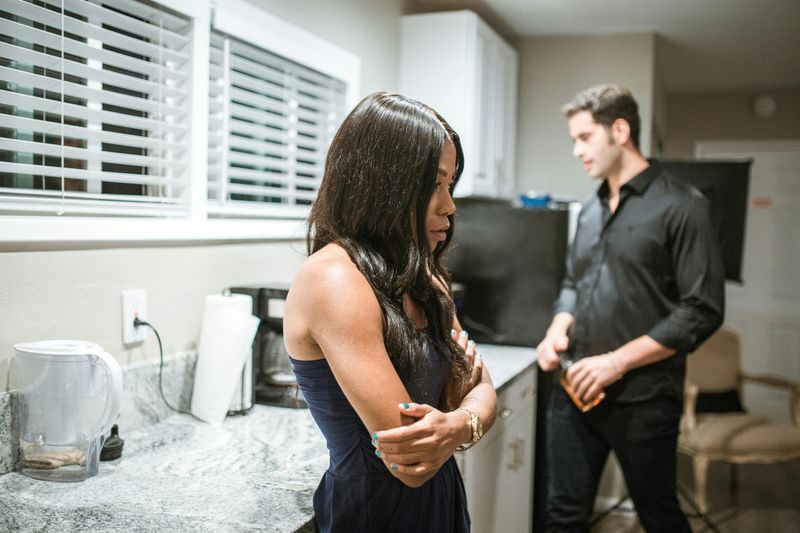Relationships start with butterflies and shared dreams, but sometimes those dreams head in different directions. Small lifestyle differences that seemed cute or manageable at first can grow into relationship-breaking issues as time passes. When two people with different daily habits, values, and expectations try to build a life together, these differences can create cracks in even the strongest foundations. Understanding these potential deal-breakers might help you navigate them before they become too big to fix.
1. Money Management Mismatches
When one partner saves every penny while the other splurges on impulse buys, financial tension becomes inevitable. These opposing money mindsets create daily friction that builds resentment over time.
A saver might feel anxious watching their partner spend freely, while a spender might feel controlled or judged. These feelings often escalate during major life decisions like buying a home or planning for retirement.
Financial incompatibility ranks among the top reasons relationships fail. Without compromise and clear communication about budgeting, saving goals, and spending priorities, couples find themselves arguing about much more than just money – they’re fighting about security, freedom, and respect.
2. Sleep Schedule Conflicts
Night owls and early birds might find romance initially exciting, but the charm fades when sleep patterns clash long-term. Imagine your partner’s alarm blaring at 5 AM while you finally fell asleep at 2 AM, or them snoring peacefully while you’re wide awake at midnight.
Beyond just feeling tired, mismatched sleep schedules mean less quality time together. When one person consistently wakes up as the other goes to bed, couples lose those intimate bedtime and morning moments that build connection.
Many couples underestimate how sleep differences affect mood, patience, and even health. The partner who constantly adjusts their natural rhythm often develops resentment, while both may suffer from chronic sleep deprivation and its relationship-damaging effects.
3. Cleanliness Standards Gap
One person’s organized chaos is another’s unbearable mess. When neat freaks and clutter-comfortable people share space, daily friction becomes routine. The tidier partner feels disrespected and overwhelmed, constantly cleaning up after someone who doesn’t notice or appreciate their efforts.
Meanwhile, the more relaxed partner feels criticized and controlled, walking on eggshells in what should be their sanctuary too. Small comments about dishes in the sink or clothes on the floor evolve into loaded accusations about character flaws and respect.
This difference seems superficial but cuts deep because it affects every shared space and daily interaction. Without compromise, the clean partner burns out from overwork while the messier one feels constantly inadequate – a recipe for relationship disaster.
4. Social Battery Differences
When an extrovert falls for an introvert, the initial attraction to opposite qualities can later become a source of conflict. The social butterfly craves weekend parties and group activities to feel energized, while their homebody partner needs quiet time to recharge.
Friction builds when the extrovert feels held back or the introvert feels constantly drained. “You never want to go out” battles with “You’re never home” as both partners feel their needs are being ignored.
This mismatch forces difficult compromises. The introvert might push beyond their comfort zone until they’re emotionally exhausted, while the extrovert might suppress their social needs and grow resentful. Without understanding and respecting these fundamental differences, couples often find themselves living increasingly separate lives.
5. Exercise and Health Priorities
When one partner hits the gym daily while the other considers walking to the fridge exercise enough, lifestyle conflicts emerge. The fitness enthusiast might schedule vacations around marathon events while their partner dreams of relaxing beach days with cocktails.
Food becomes another battleground. Meal prep and protein shakes clash with takeout preferences and dessert cravings. The health-conscious partner might feel undermined when junk food enters the house, while the other feels judged for their choices.
Over time, these differences can lead to diverging physical appearances and energy levels. The fit partner might lose attraction or worry about their partner’s health, while the less active one feels inadequate or resents the time spent apart during workouts. These growing gaps often create irreparable relationship divisions.
6. Technology and Screen Time Habits
Modern relationships often struggle when one partner lives through their smartphone while the other prefers unplugged connections. Picture dinner dates where one person scrolls through social media while the other stares at them, waiting for eye contact that rarely comes.
The tech-savvy partner feels their behavior is normal and gets defensive when criticized. Meanwhile, the less connected partner feels invisible and replaced by a device. These feelings compound when bedtime arrives and one person falls asleep to the glow of a screen while the other craves conversation.
This difference reflects deeper values about presence and attention. When technology consistently interrupts intimate moments, the relationship suffers death by a thousand digital cuts, with real-life connection gradually replaced by parallel lives lived side by side but separately.
7. Parenting Philosophy Clashes
Few differences strain relationships like disagreements on raising children. One parent might believe in strict discipline and structured routines while the other favors a more relaxed, free-range approach. These opposing views create daily conflicts that children quickly learn to navigate and sometimes exploit.
The stricter parent feels undermined when their partner allows rule-breaking, while the lenient one thinks their counterpart is too harsh. Children sense this division, often causing them to play parents against each other and creating even more tension.
Unlike other differences that affect only the couple, parenting conflicts impact the entire family’s emotional health. When parents consistently contradict each other’s authority and methods, they not only damage their relationship but potentially harm their children’s sense of security and understanding of boundaries.
8. Career Ambition Imbalances
When one partner climbs the corporate ladder while the other prioritizes work-life balance, relationship strain becomes inevitable. The career-focused person works late, travels frequently, and brings stress home, while their partner may feel abandoned or that their own career takes a backseat.
Relocations for job opportunities become especially contentious. The ambitious partner sees refusing a promotion as unthinkable sacrifice, while the other views uprooting their life as equally significant. Resentment builds as one person’s dreams seemingly matter more.
Financial imbalances often accompany ambition differences, creating power dynamics that further complicate things. Without careful navigation and mutual respect, couples find themselves growing apart as their professional lives pull them in different directions, with neither feeling truly supported in their chosen path.
9. Family Boundary Disagreements
Some people consider weekly family dinners non-negotiable, while others prefer maintaining distance from relatives. This fundamental difference creates ongoing tension as one partner feels their family values are disrespected while the other feels their personal boundaries are ignored.
Holiday seasons amplify these conflicts. Whose family gets priority? How much time is reasonable to spend with in-laws? When one partner reluctantly attends family gatherings, their discomfort is obvious and creates awkwardness for everyone.
Cultural backgrounds often influence family expectations, making compromise even harder. The partner wanting closer family ties may feel their heritage disrespected, while the boundary-setter feels controlled by traditions they don’t share. Without finding middle ground, couples face recurring fights that damage both their relationship and extended family connections.
10. Long-Term Location Preferences
City lovers and country dreamers face tough challenges when building a shared future. One partner thrives on urban energy, walkable neighborhoods, and career opportunities, while the other longs for open spaces, quiet surroundings, and a slower pace.
Compromises like suburban living often leave both parties unsatisfied. The city enthusiast feels isolated from culture and convenience, while the rural-minded partner still feels confined by too many neighbors and too little nature. These feelings of sacrifice grow heavier with time.
This difference reflects deeper values about what makes life worth living. When partners can’t agree on where to plant their roots, they struggle to grow together. Eventually, one person often lives in an environment that never feels like home, creating a permanent undercurrent of discontent that erodes relationship satisfaction.










